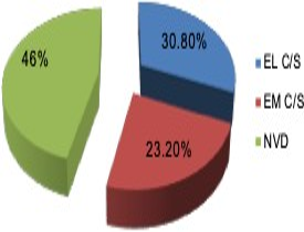Abstract
This study was designed to evaluate maternal and obstetrical factors associated with a successful trial of labour after one caesarean section (TOLAC) as well as evaluating the associated fetal and maternal outcomes and to determine the rate of vaginal delivery and repeated C/S. A prospective cross-sectional study was done on 237 women with previous one C/S then patients were selected for the trial of labour based on the department protocol. Those who were chosen for TOL were strictly monitored & observed for the progress of labour and the outcomes were recorded in terms of mode of delivery, maternal & fetal complications and were analysed and compared with those who had repeated C/S. Seventy-three (30.8%) patient was delivered by elective C/S without trial, 109 (46%) of the patients who were admitted to labour room delivered vaginally while 55 (23.2%) delivered by emergency C/S. It has been found that maternal BMI of (<25), history of vaginal birth after C/S (VBAC) and smaller gestational age were significantly associated with the success of TOL and can predict the outcome. Higher maternal & fetal complications rates were reported in cases delivered by emergency C/S compared to those who delivered vaginally or through elective C/S. The trial of labour after one caesarean section is a safe alternative to repeated C/S and decreases the associated morbidities with repeated C/S. The success rate of TOLAC reported in this study was (66.5%). A successful TOLAC is associated with normal maternal BMI, smaller gestational age and history of the previous VBAC.
Full text article
Authors

This work is licensed under a Creative Commons Attribution-NonCommercial-NoDerivatives 4.0 International License.

